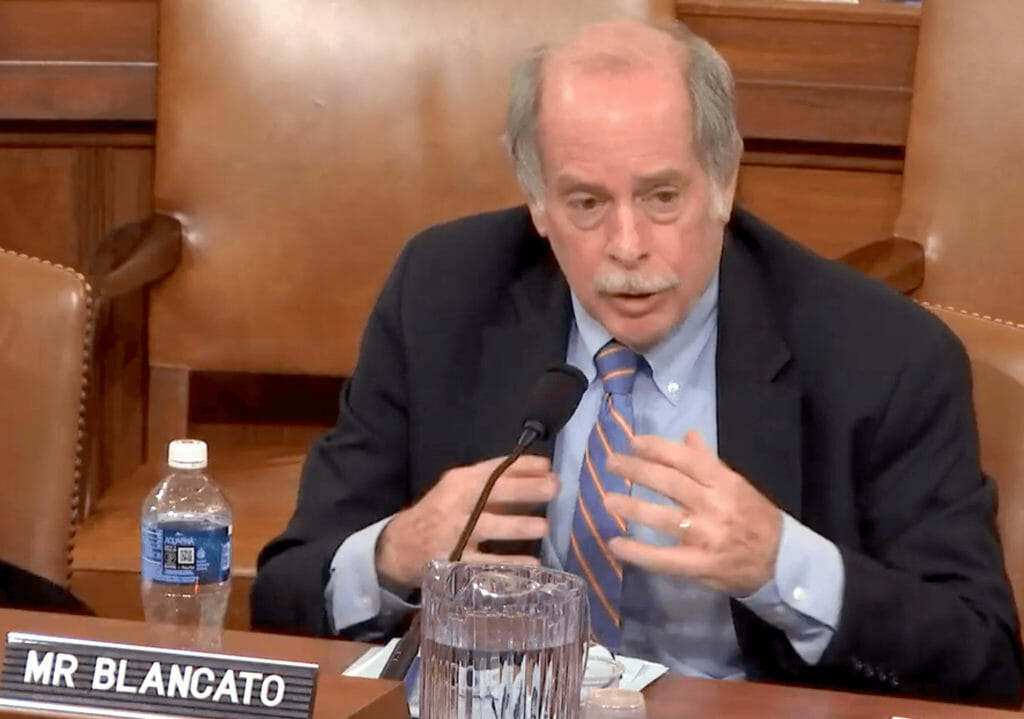
Robert Blancato, national coordinator of the Elder Justice Coalition,
told the House Ways and Means Committee. (YouTube)
Congress must “replace denial with a detailed, bipartisan legislative proposal on long-term care” to address the needs of a growing older population facing high costs for healthcare and housing, Robert Blancato, national coordinator of the Elder Justice Coalition, told the House Ways and Means Committee at a hearing Thursday.
Blancato, one of six hearing witnesses, and Rep. Richard Neal (D-MA), chairman of the committee, both noted that assisted living costs more than $40,000 per year, on average.
“Navigating a fragmented and insufficient long-term care system can be not only confusing and emotionally taxing, but also enormously expensive – even unaffordable. …These high price tags weigh heavily on aging Americans and their families as they try to plan for future long-term care needs,” Neal said in prepared remarks, noting costs associated with nursing homes and home healthcare as well.
Long-term care-related costs are the biggest unfunded liability facing baby boomers, Blancato said in his prepared remarks. “Many older adults rely on Medicaid to fund their long-term care needs. However, states are increasingly considering waivers that would block-grant Medicaid, which could lead to individual caps on care funding,” he said.
Approximately 16.5% of assisted living residents rely on Medicaid to cover their assisted living services, according to the National Center for Assisted Living.
The National Investment Center on Seniors Housing & Care-funded study that found that 54% of the 14.4 million middle-income older adults in 2029 in the United States will lack the financial resources to pay for senior living and care, Blancato said, indicates that “future ability to privately pay [for long-term care needs] may be in jeopardy.”
The witness said “all viable proposals deserve to be vetted, studied and moved forward,” including those involving Medicare and Medicaid reform, to address long-term care costs. “I believe we can all agree that something needs to be done,” he said.
A “real national solution,” Blancato said, should include:
- A strong Medicaid program that continues to support home- and community-based services over institutional care.
- Possibly a long-term care benefit in Medicare.
- Use of the tax code to provide a “meaningful” tax credit for family caregivers and a tax deduction for the purchase of private long-term care insurance.
‘Disturbing pattern of abdication’
In addition to cost issues, Blancato noted in his prepared remarks, “We see a disturbing pattern of abdication by certain federal agencies vested by law with the responsibility to ensure quality care in nursing homes, assisted living and long-term care facilities.” He in part called for additional funding and training for long-term care ombudsmen “so they can expand their important work into assisted living.”
Hearing witness Richard Mollot, executive director of the Long Term Care Community Coalition, told committee members that alternatives to nursing home must be affordable, accessible and safe.
“Seniors and families want and deserve options to nursing homes that provide safety in a more home-like setting,” he said. “While most states are rightfully opening up assisted living to Medicaid beneficiaries, the utter lack of federal standards in this sector has, unsurprisingly, led to increasing reports of rampant abuse and neglect. Our seniors and their families deserve better.”
Mollot also cited “inadequate access to humane dementia care” as an issue involving assisted living and nursing home operators.
“Far too many facilities fail to anticipate the needs of individuals with dementia or equip their staff with the knowledge and skills necessary to provide comfort and care to residents who are experiencing common behavioral and psychological symptoms of the disease,” he said. “In what other industry would it be acceptable to be unable to meet the needs of the majority of one’s customers?”
Care planning benefit eludes most
Hearing witness Robert Egge, chief public policy officer of the Alzheimer’s Association, shared the findings of a recent study that found that in 2017, less than 1% of Medicare beneficiaries living with dementia received comprehensive dementia-specific care planning that could improve care, quality of life and medication management as well as reduce hospitalizations and emergency department visits. This is despite the fact that since 2017, physicians and other healthcare professionals have been able to obtain reimbursement for providing such care planning.
“For the benefits of care planning to reach more Americans affected by Alzheimer’s, more clinicians must use the care planning benefit,” he said. The bipartisan Improving Hope for Alzheimer’s Act (H.R. 1873 / S. 880), Egge added, would help achieve this goal by requiring the Department of Health and Human Services to educate clinicians and report to Congress on ways to increase the benefit’s use and on related barriers.
“This bill has already garnered significant bipartisan support in both chambers, and we urge the Committee on Ways and Means to hold a markup,” he said. “We look forward to working with the bill’s sponsors and committee leadership to ensure its movement in the full House and Senate.”
Watch the hearing here. Read witness testimony here. Read Neal’s opening statement here.



